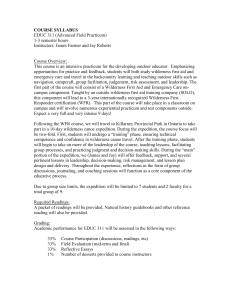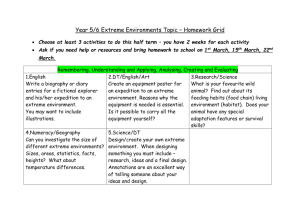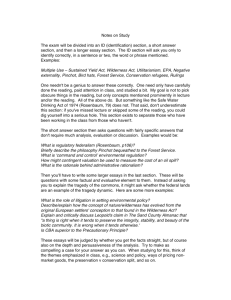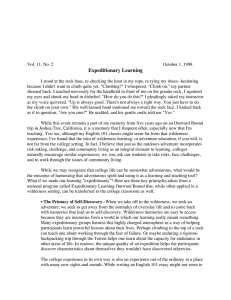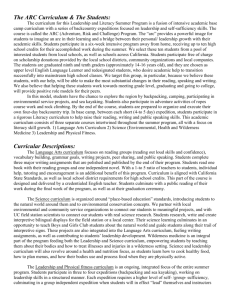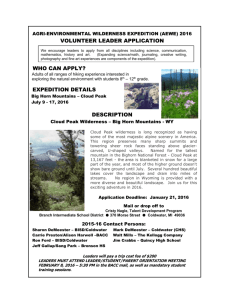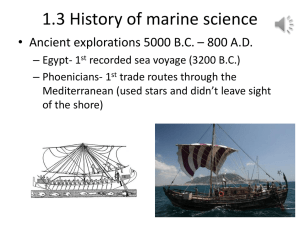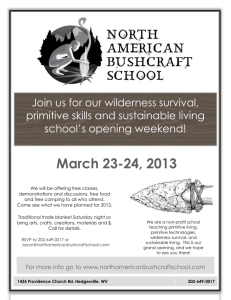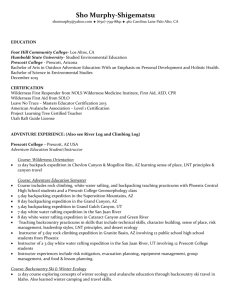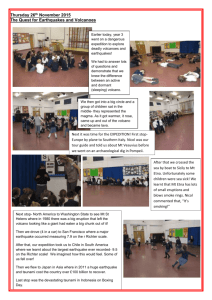COURSE SYLLABUS EDUC 311 (Wilderness Instructors Course) 1
advertisement
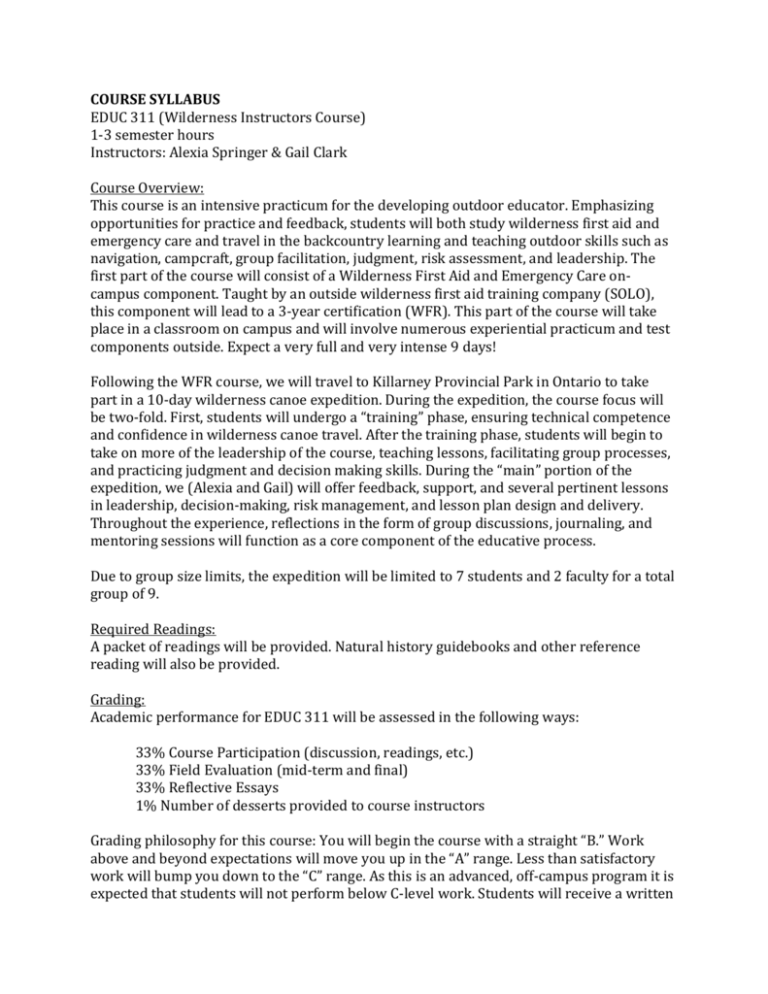
COURSE SYLLABUS EDUC 311 (Wilderness Instructors Course) 1-3 semester hours Instructors: Alexia Springer & Gail Clark Course Overview: This course is an intensive practicum for the developing outdoor educator. Emphasizing opportunities for practice and feedback, students will both study wilderness first aid and emergency care and travel in the backcountry learning and teaching outdoor skills such as navigation, campcraft, group facilitation, judgment, risk assessment, and leadership. The first part of the course will consist of a Wilderness First Aid and Emergency Care oncampus component. Taught by an outside wilderness first aid training company (SOLO), this component will lead to a 3-year certification (WFR). This part of the course will take place in a classroom on campus and will involve numerous experiential practicum and test components outside. Expect a very full and very intense 9 days! Following the WFR course, we will travel to Killarney Provincial Park in Ontario to take part in a 10-day wilderness canoe expedition. During the expedition, the course focus will be two-fold. First, students will undergo a “training” phase, ensuring technical competence and confidence in wilderness canoe travel. After the training phase, students will begin to take on more of the leadership of the course, teaching lessons, facilitating group processes, and practicing judgment and decision making skills. During the “main” portion of the expedition, we (Alexia and Gail) will offer feedback, support, and several pertinent lessons in leadership, decision-making, risk management, and lesson plan design and delivery. Throughout the experience, reflections in the form of group discussions, journaling, and mentoring sessions will function as a core component of the educative process. Due to group size limits, the expedition will be limited to 7 students and 2 faculty for a total group of 9. Required Readings: A packet of readings will be provided. Natural history guidebooks and other reference reading will also be provided. Grading: Academic performance for EDUC 311 will be assessed in the following ways: 33% Course Participation (discussion, readings, etc.) 33% Field Evaluation (mid-term and final) 33% Reflective Essays 1% Number of desserts provided to course instructors Grading philosophy for this course: You will begin the course with a straight “B.” Work above and beyond expectations will move you up in the “A” range. Less than satisfactory work will bump you down to the “C” range. As this is an advanced, off-campus program it is expected that students will not perform below C-level work. Students will receive a written and oral evaluation at the middle and conclusion of the program from the course leaders in addition to graded comments on required assignments. Assignments: Reflective Essays- Several times during the course, you will be required to write short essays reflecting on your experience. The essays are designed to help bring together the experiences that you will go through with the theory and ideas that we will cover on the course. Specific framing questions will be given to help guide your thoughts. We suggest that you keep notes on your day-to-day experience and that you use these “field notes” to elaborate on at the end of each component. Essays will be assessed based upon depth of insight and analysis and connections of theory to practice. Teaching/Leading Practicums- You will also have the opportunity to both lead the group and teach specific lessons. In each of these, you will be assessed on quality of preparation and organization of your practicum opportunities as well as the degree to which you take feedback and incorporate it into your next opportunity for leading and/or teaching. Students will be evaluated by both peer and instructor feedback which will be summed up in the mid-course and final course evaluations. Course Participation- We expect a high level of participation and engagement on this course. Please do not expect to be guided on this experience—students will take on the bulk of both planning and day to day leading of the course. Students who are highly engaged will constantly be asking, “what else can I do?” both in terms of physical work and emotional/group leadership support. Exceptional “expedition behavior” is the benchmark of effective outdoor leaders and is expected of all on this course. Feedback on course participation will be given in both the mid-course and final course evaluation meetings. IMPORTNANT LOGISTICS All students must have a valid passport to cross back into the US from Canada. Please ensure that your passport is current and valid. If you do not have one, apply immediately as the delay can be substantial. See IPO for more information. Student housing and meals are “on your own” during the on-campus portion of the course. If you wish to stay in on-campus housing at Earlham during the WFR component, there is a fee assessed – see residence life for more info. Once on our expedition to Canada, housing (in the form of luxurious tents) and food are provided. Planned Itinerary: (Subject to change!) May 14-15 On-campus WFA component (8am-4pm daily) May 14-22 On-campus WFR component (8am-4pm daily) May 23 Pack out Day (equipment, food, duffle shuffle, etc.) May 24 Depart for Killarney Provincial Park May 25-June 2 In Field June 3 Out of field, travel ½ way back to Earlham June 4 Return to Earlham, clean up (off-program by 6pm)
